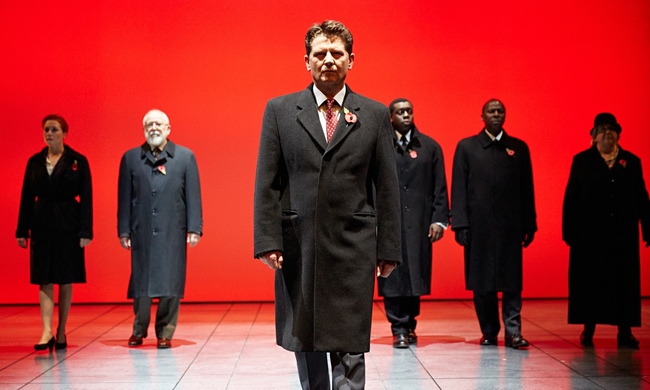The Absence of War (amongst other things)
David Hare’s The Absence of War is about the long, slow death of the Labour Party. Despite being written twenty two years ago, it still manages to be more topical than Jack Thorne’s 2014 Hope. You can see it at the Crucible now. It looks like this.

If you plot a graph from Yes, Minister to the The Thick of It, with time along the bottom and cynicism up the side, then half way along the steeply ascending line you would find The Absence of War. In 1992, the memory of hope was still fresh. It was something to be mourned. After Blair, the body is cold and all we have left to write about is the accumulation and articulation of power by small, scared leaders who themselves feel stifled.
You can’t move these days for elegies to the by-gone left.* But in the absence of real popular anger at the all-but annihilation of the global financial system, post-socialists only have themselves left to write about. Like this.
Hare was wrong about all Labour leaders. Blair was not “best at losing”. He had other more serious flaws. But, like a genetic character defect, Hare’s analysis seems to have skipped a generation and landed, with alarming prescience, in 2015: a Labour party unable to draw votes away from an unpopular Tory government; a leader incapable of “breaking through”.
It’s a funny, cutting and beautifully written play but mostly it is disheartening (your choice at The Crucible at the moment is between The Absence of War and Sarah Kane’s Blasted. Neither leave you with the warm fuzzies). To see a playwright articulate so concisely a movement’s inability to express itself is hard. In Hare’s Labour, dishonesty has crept into the heart of power, the party is at war with itself and in contempt of its members, and the only noble gesture left is pathetic self-sacrifice.
The Absence of War lacks answers. But it articulates the problem brilliantly: a movement with solidarity at its heart will always struggle to breathe in an atmosphere oxygenated by individualism. The absence of the title is also the absence of common purpose and common identity. Thinking of World War Two in these terms, as the characters do, is nostalgic and wrong, but it’s always tempting.
We desperately need new ways to build unity into our increasingly fragmented polities - ways that are not dependent on nationality, industry, race or religion. In fact, ways that can speak over all these things. It’s no surprise such developments are thin on the ground. In the absence of war, finding common ground is hard. Regionalism anyone?
- For example, Ross McKibbin’s Labour Vanishes or John Harris’ coverage of UKIP in The Guardian.